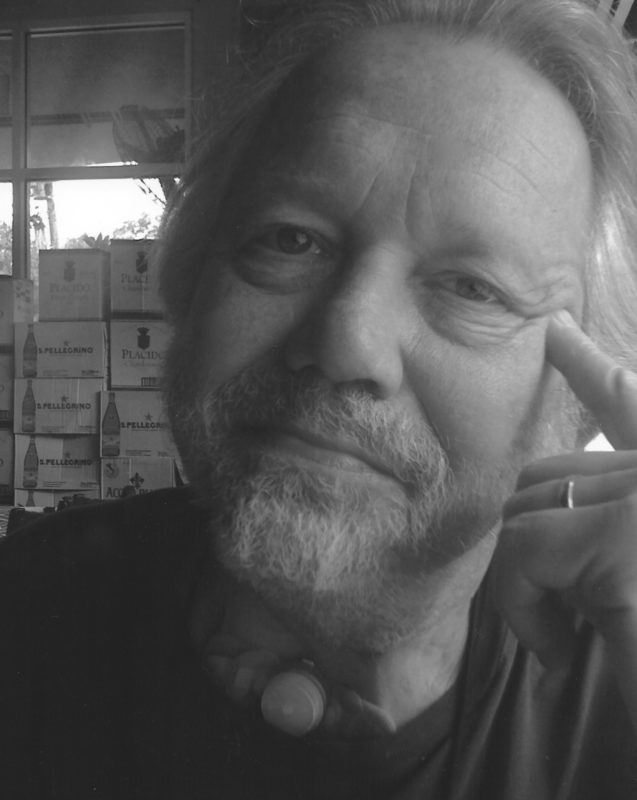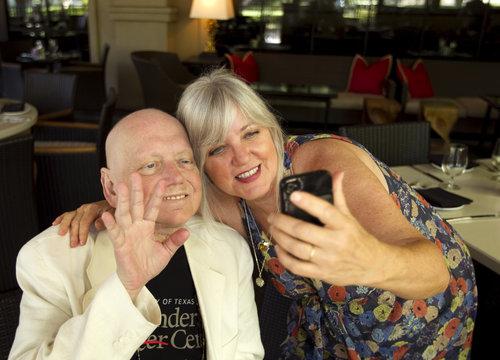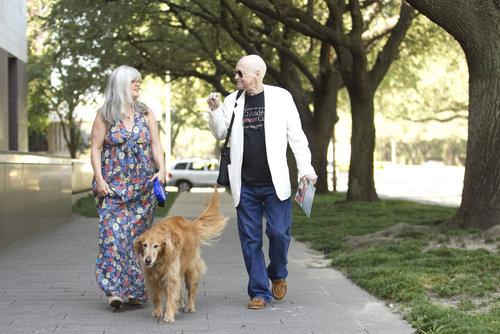“Joe Gracey’s time as a patient at The University of Texas MD Anderson Cancer Center, both in the 1970s and later in 2009, when his cancer returned, made his treatment and survival experiences important to the research department. He was a willing participant, happy that through his experiences he was able to help towards meeting the goal stated by MD Anderson: “Making Cancer History.” These days it’s difficult to find someone whose reality has not been touched by cancer in some way. It is our sincere feeling that by sharing our many musings on the subject of cancer as patient and caregiver we might help those who have been affected by the disease and loss find kinship, courage, and peace.”
Joe and Kimmie’s duet memoir, “Radio Dreams” offers hope and comfort to others whose lives have been affected by cancer. Honor Joe Gracey’s courage and join the effort to fund this project. Visit the Kickstarter here – http://bit.ly/RadioDreams
Joe Gracey was proud of his role in helping the research department at MD Anderson. Kimmie remains active with the public relations department at MD Anderson. Below, see a video and an interview she did for them on caregiving. Also, read an excerpt from “Radio Dreams” of a letter Joe Gracey wrote at the request of the speech pathology department to a fellow patient who was about to lose his voice.
Finding comfort in Making Cancer History®
“You don’t have to think about cancer all the time.” – Kimmie Rhodes, Caregiver
A caregiver’s advice for preserving quality of life
By Cynthia DeMarco
Singer Kimmie Rhodes had been married to legendary music producer Joe Gracey for 28 years when he died of metastatic esophageal cancer in Nov. 2011. The couple met in 1979, after Joe completed treatment at MD Anderson for his first bout with cancer — which involved the complete removal of his tongue.
“I was actually married to a man who didn’t speak,” Kimmie says. “In a way, I became the voice he lost, but he could communicate very well without speaking.”
The couple married in 1982, and Joe reinvented himself as a record producer, while Kimmie kept performing. They enjoyed almost 30 years together before Joe’s cancer returned in the spring of 2008.
A long-time Austin resident, Kimmie had never heard of MD Anderson before meeting her husband. But once here, she learned a lot about being a caregiver to a cancer patient.
Here’s Kimmie’s advice for other caregivers.
1. Take care of yourself
The first thing Kimmie learned was the importance of taking care of herself.
“People caring for cancer patients can get hyper-focused, but you don’t have to let yourself be consumed by it,” Kimmie says. “Shift your attention and think about something else for a while. Ask for help if you need it. And have hope. That’s what MD Anderson is all about.”
2. Make plans
Kimmie maintained the couple’s quality of life by planning activities around town — both solo and together — while her husband was receiving treatment here.
“You don’t have to think about cancer all the time,” she says. “You can still have fun. So look around and find things that feed your soul. There are so many places around Houston to see and do interesting things. It has art galleries, science museums, restaurants and parks. In the spring, you can even tour homes with azaleas blooming.”
3. Express gratitude
For Kimmie, finding things to be thankful for every day was the key to maintaining an upbeat attitude. This philosophy even proved useful after her husband had died.
“The answer to grief is gratitude,” Kimmie says. “I lost Joe to cancer, but I don’t look at it as a failure. You can either be sorry for what you didn’t get to have, or thankful for what you did. I had Joe for 28 years, and we had a great life together.”
Request an appointment at MD Anderson online or by calling 1-877-632-6789.
Excerpt from Radio Dreams Chapter 8: The White Moth
The following is a letter Joe Gracey wrote at the request of his speech pathologist to a patient who was about to permanently lose his voice to cancer and was preparing to undergo a total glossectomy and laryngectomy at MD Anderson Hospital.
Hello,
Our speech pathologist told me about you last time I saw her. I assume you will be having a total glossectomy (tongue) and laryngectomy (larynx) like I did thirty years ago. Couple of things I can tell you based on my experience, for what it may be worth:
1) Squamous cell carcinoma is very slow to spread, if at all, so your chances of long-term health are extremely good. I am living proof of this.
2) Not being able to speak has its advantages as well as its frustrations, of course. I do miss singing, which is a *&&^%$%$ drag, but on the other hand I almost never say anything I wish I hadn’t said, because by the time I write it down I have edited myself. And, people think I am wise because I don’t rattle on about stuff like most people. I am not.
3) Now they have ways to give you a pretty good voice back, such as TEP, which I am myself about to try out, and which seems to hold real promise for most of us.
4) You will still be able to eat and taste food. The only flavor I don’t really taste is sweet, which means I don’t care much about dessert, but I still love and enjoy ice cream. This is because most flavor actually resides in the sense of smell, not in the tongue. I’d say about 95%, in fact. At first it may not seem that way to you, but as time goes on you will begin to sense aromas and tastes more fully. I also seem to have some residual ability to taste bitter and even sour, because I have the feeling that there are a few taste buds that reside in other parts of the mouth and throat besides the tongue. So, don’t mourn the loss of food and it’s pleasures . . . they will still be there. In fact, one of my jobs is as a food and travel writer, and I love good wine and food.
5) You will have to get used to the whole thing, of course. I live with a certain amount of frustration and I think you have to go through a period of mourning for the loss of your voice, but life does go on and eventually you figure out ways to cope. Therapy is good. A supportive spouse is good. A sense of humor and a willingness to adapt and not sulk or throw tantrums is good. I wish I had something wise and terrific to tell you that would fix everything and make it ok, but I think the thing to remember is that the human spirit is very able to handle setbacks and problems, much more than you may know right now. I would rather have lost my voice than my sight, or my hearing, or my legs. It is in fact almost a minor handicap when you get right down to daily living, far as I am now concerned. There are many ways to cope, and deal with it, and laugh at it, if you just plow ahead and figure it is just a minor test of your will to live fully and well and happily.
I wish you all the luck on earth, and if meeting me personally would help you of course we can do that. I am out here in Spicewood west of Austin on 71. I am in fact going to MDA to have some more stuff done, the TEP insertion and some dental work, from the 13th to the 23rd, so perhaps we can even meet there before they haul you in for your fun and games.
Yours Sincerely,
Joe Gracey
P.S. The MDA team are the greatest people on earth. Lean on them- they can help, too…
Visit the “Radio Dreams” Kickstarter Here – http://bit.ly/RadioDreams





